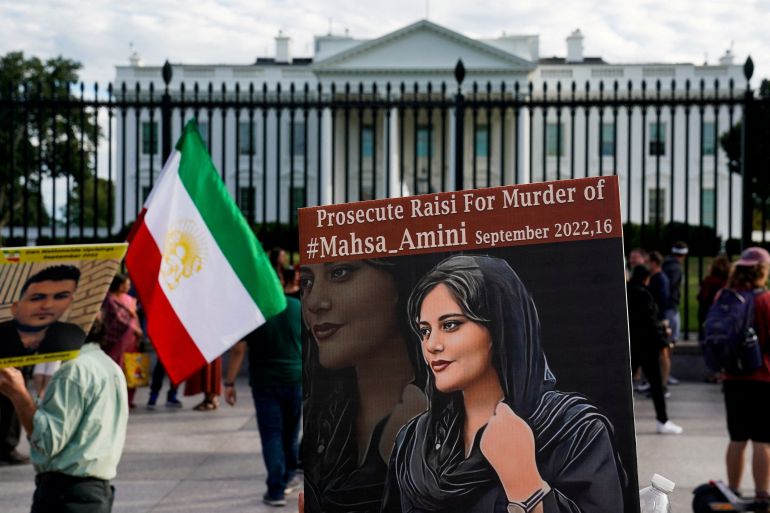US announces new Iran sanctions as prisoner swap looms
Washington targets Iranian officials and state-linked media outlets on first anniversary of Mahsa Amini’s death.

Washington, DC – The United States has imposed sanctions on dozens of Iranian officials and entities accused of being involved in the “violent suppression” of anti-government protests that followed the death of Mahsa Amini in police custody in Tehran last year.
The sanctions, which targeted top security officials and state-affiliated media outlets on Friday, came as the US and Iran are expected to exchange prisoners as early as next week as part of a newly announced deal.
Keep reading
list of 3 itemsUS defends prisoner swap deal with Iran against Republican attacks
Top Iran official says UAE may ‘destabilise’ security over disputed islands
The US penalties also coincide with the first anniversary of the death of Amini, a 22-year-old Kurdish woman who was arrested by Iranian police for violating the country’s conservative dress code.
The incident sparked weeks-long demonstrations across Iran that were met with a harsh crackdown by security forces. Iran has denied Amini was beaten or mistreated in detention.
“As we approach one year since Mahsa Amini’s tragic and senseless death in the custody of Iran’s so-called ‘Morality Police,’ we recall that the movement of men and women across Iran … was met with horrific violence,” US Treasury official Brian Nelson said in a statement.
He added that the sanctions were imposed in coordination with Washington’s Western allies, including Canada and the United Kingdom.
US President Joe Biden also paid tribute to Amini on Friday, saying that she inspired a “historic movement” of people demanding gender equality and respect for human rights in Iran and around the world.
“In the face of continued oppression and violence, the citizens of Iran remain committed to this movement and to their fight for a free and democratic future,” Biden said in a statement.
Iran has denied attacking peaceful protesters and described the demonstrations as foreign-backed riots.
The Iranian media outlets sanctioned by the US on Friday include Press TV, Fars News Agency and Tasnim News Agency. The Treasury also targeted top executives at a cyber-firm that it said assisted the Iranian government in the “censorship and filtering of the Internet”.
The sanctions freeze the firms’ and individuals’ assets in the US and restrict financial institutions across the world from doing business with them.
The Biden administration’s move also signals that the US will push on with its sanctions policy against Iran despite the looming prisoner swap deal.
The agreement will see Iran release five imprisoned US citizens in exchange for Washington allowing Tehran to access $6bn in Iranian funds frozen in South Korea under US sanctions for humanitarian purposes. The US will also free five Iranians from American prisons.
The deal has faced mounting criticism from Republican legislators who have accused the Biden administration of handing Iran $6bn.
However, US officials have stressed that the funds are Iran’s own, saying that Washington’s policies towards Tehran will not change.
“We do remain focused on constraining Iran’s nuclear programme, constraining its destabilising behaviour. We remain committed to ensuring it never obtains a nuclear weapon,” State Department spokesperson Matthew Miller said earlier this week.
The US and Iran have seen heightened tensions since 2018, when former US President Donald Trump nixed a multilateral deal that saw Tehran scale back its nuclear programme in exchange for the lifting of sanctions against its economy.
Biden came into office in early 2021 on a promise to revive the Iran nuclear accord, formally known as the Joint Comprehensive Plan of Action (JCPOA).
But as several rounds of indirect negotiations failed to restore the pact, Washington continued to enforce its sanctions regime against Tehran and piled on more penalties.
JCPOA talks were eventually put on hold, and attempts to revive them were complicated by the crackdown on antigovernment protesters in Iran as well as accusations that Tehran was providing Moscow with drones for use in Ukraine.
Iran, which has denied seeking a nuclear weapon, has escalated its nuclear programme since the JCPOA fell apart.